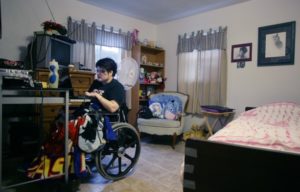 A world pandemic may have cramped your style – keeping you from your usual activities and seeing co-workers and friends. But since paralysis brings greater health risks in general, people with spinal cord injuries already understand the need for distancing to avoid infection.
A world pandemic may have cramped your style – keeping you from your usual activities and seeing co-workers and friends. But since paralysis brings greater health risks in general, people with spinal cord injuries already understand the need for distancing to avoid infection.
The new challenge of Coronavirus for people living with SCI is to keep our social distancing from turning into social isolation. In short, we need to find ways to ward off loneliness.
How do you prevent yourself from sliding into a state of social disconnectedness?
We recently spoke with Dr. Jennifer Piatt, an expert at the School of Public Health at Indiana University-Bloomington, and Dr. Melissa Zahl, of the University of Utah, who outlined successful strategies for avoiding loneliness:
8 Ways to Combat Disconnectedness
Try something new
Yes, something you’ve never tried. Depending on your level of injury, you might take up cooking, painting or crafting, consider joining a book club or checking out a faith-based online group (they are often good places to begin).
Contact a friend, and make it a frequent priority
Gather your connections’ phone numbers, mailing addresses, and email addresses – and use them!
Sign up for a free Zoom video chat account here
Send pictures and letters through email—you might try writing old-fashioned letters.
Get outdoors
Even if you can only go out for a few minutes and it’s difficult to manage– schedule time to do it anyhow. Hearing birds, or even the silence of nature, is a powerful mind cleanser.
What’s going on at your Doctor’s office? Call them.
Gather all the numbers of your essential doctors and therapists.
Some therapists are visiting patients at home while wearing personal protective equipment (PPE).
Find out now how your healthcare providers are taking care of their patients, and what to do if you need a COVID-19 test.
Get active:
Moving your body is important–, even if you have a higher level of injury.
Stretching and moving creates a routine that can help you sleep.
Assess how much personal risk there is to having a caregiver come into your home if you need help with exercise or to get out of the house
Watch less news:
Try tuning in just once or twice a day for only 10 or 15 minutes – instead of having it on all day. Dial down social media news reports and rumor mills.
Then turn off the news and focus on activities that help you stay happy and positive.
Join our Private Facebook Group
We offer a closed community where you’re surrounded by others who are living in your world. Membership is strictly limited to people with spinal cord injuries and members of their families. Click here for membership
Get help if you feel stuck:
Disaster Distress Helpline* provides 24/7, 365-days-a-year crisis counseling and support to people experiencing emotional distress related to natural or human-caused disasters. Call 1-800-985-5990 or text TalkWithUs to 66746 to connect with a trained crisis counselor.
*(The helpline is a service of the Substance Abuse and Mental Health Services Administration (SAMHSA) the agency within the U.S. Department of Health and Human Services (HHS) that leads public health efforts to advance the behavioral health of the nation.)
Leave a Reply